AudioCulture
The noisy library of New Zealand music
Te pātaka korihi o ngā puoro o Aotearoa
The Terminals
At the band’s heart are two of the South Island’s most enduring songwriters, vocalist Stephen Cogle, who wrote the music, and drummer Peter Stapleton, who wrote the often darkly humorous lyrics that Cogle sings in his unique cavernous voice.
Two distinct eras can be discerned in the group’s musical progression. First was the “dream line-up for fans of Flat city’s own brand of garage punk” pointed to by early advocate Bruce Russell in Alley Oop, March 1989.
Cogle and Stapleton were not alone in The Terminals. Throughout, Mick Elborado (AKA MS Agro, late of Drowning Is Easy and Scorched Earth Policy) remained a constant in the group, providing keyboards, organ, synth and at times guitar.
Founding bass player Susan Heney was vital in those early years, having already done time in the Flying Nun released group 25 Cents. Guitarist and songwriter Ross Humphries had a previous creative life in Christchurch post-punk groups, culminating in the powerful and short-lived Pin Group, before moving on to The Great Unwashed and Bailter Space.
The Terminals phase one delivered two startling records: a promising 1988 EP (Disconnect) and a devastating and definitive 1990 album (Uncoffined) that the band and their fans waited two long years for Flying Nun to deliver before the label abruptly cut the group loose.
That marked the beginning of the second Terminals incarnation, with the addition of more able and adventurous players in Brian Crook, guitarist, occasional vocalist and songwriter from Scorched Earth Policy, Max Block and The Renderers, together with Maryrose Wilkinson, his partner in the second two outfits, on bass. Filmmaker, bass player and cellist John Chrisstoffels from Vague Secrets replaced Wilkinson, who had replaced Heney.
Between 1990 and 2014, three ever darker and more confrontational LPs emerged.
The new line-up tapped into the musical adventure and international underground opened up and embraced by Xpressway Records in the late 1980s and early 1990s, a second creative phase in the life of both.
Between 1990 and 2014, three ever darker and more confrontational LPs emerged – Touch in 1992 and Little Things in 1995 on German label Raffmond Records, followed 12 years later by Last Days Of The Sun on American indie Last Visible Dog. A raft of fine singles and revealing compilations dotted those years.
The ever-quotable Bruce Russell discerned early on that there were two sets of connected influences in The Terminals, “clearly rooted in a tradition of psychotic white blues stemming from such varied sources as the Thirteenth Floor Elevators, 1960s surf punk, Pere Ubu, and the early works of John Cale”. Stapleton added Can, Captain Beefheart and free jazz to the list. All pre-punk and post-punk sounds connected by an indelible sonic link.
Into the 1990s and beyond, a more free flowing improvisational bent dominated the group’s sound, reflecting Peter Stapleton’s move into that area with a string of groups and short term partnerships up to present day PSN (no longer performing) and Eye, although it had always been a part of his bands’ mind-set going right back to the 1970s in Vacuum. The ever-productive Stephen Cogle had the more strictly song-based Christchurch-based -2 (The Terminals minus Stapleton and Crook), then Dark Matter, who released a stunning album in 2014 on American indie Siltbreeze Records.
In September 2015, The Terminals reconvened in Port Chalmers near Dunedin, their second home, to record a new collection of songs with Forbes Williams producing. Nicole Moffatt (violin, vocals) from Dark Matter replaced Brian Crook, who was now resident in America.
In a broader sense these are the two Terminals – positive and negative – and when the oppositely charged wires cross, electricity arcs in a ragged blue flame and white gold sparks fly. From sublime contained contemplation to expansive electric wig out in a flash.
Walking Slow
It’s a long tale best started at the beginning. Peter Stapleton is of Christchurch Irish descent and he and Stephen Cogle were Xavier College old boys with an interest in the offbeat who linked with another wayward Catholic, Bill Direen, in the mid-1970s to form the truly seminal pre-punk group Vacuum. Most of the early Christchurch groups Roger Shepherd drew on for release through Flying Nun Records had a link to this band.
Ably outlined by historian Wade Churton in his pioneering music histories Have You Checked The Children? Punk and postpunk music in New Zealand, 1977 - 1981(first ed. 2001/ second ed. 2002), Glam, Punk and Scorched Earth Policy (2001) and his essays on The Androidss and the initial Christchurch post-punk era in Mysterex, a rich weave of era, personality, event and art relating to Cogle and Stapleton is keenly exposed and observed there.
Zoe Drayton’s extensive and insightful 10-part oral history of Peter Stapleton from her time as Audio Foundation director is yet another revealing source, available online at the arts organisation’s website. Early investigations in Garage and Alley Oop in the mid-1980s and early 1990s by Richard Langston and Bruce Russell provide good primers, as does Jon Bywater’s extensive Peter Stapleton interview for Opprobrium 1 from 1995. An extended May 2004 version is available on the NZEP website as “Capital of the Minimal”.
There were two songwriting prongs in Vacuum, Bill Direen and the Cogle/ Stapleton axis. The pre-punk group performed and recorded songs by both. Regulars at anarchic performance space Mollett Street in late 1977 and early 1978, Vacuum could be found also in 1979 at The British in Lyttelton in May, Suburbs Hall in Hoon Hay in August and Dux De Lux (for two nights) and DB Gladstone in September. They returned to The British and debuted at new venue Rock City in October of that year.
The only recorded evidence left by the first Vacuum was laid down at Robbins Recording Studios in Christchurch and initially thought lost until ‘Love In The Retail Trade’ appeared on Bilderine’s Split Seconds in 1984. More recently, two multi-song singles containing two Cogle/ Stapleton era Vacuum compositions’ ‘Shade’ and ‘Walking Slow’ were made available on Siltbreeze Records in 2011 and 2012.
Cogle’s departure from Vacuum in early 1980 allowed a more focused vehicle for his and Stapleton’s songs to emerge first as Superior Background Music for one show, before the new group morphed into Victor Dimisich Band. Allen Meek (guitar and organ) and Tony O’Grady (guitar) filled out the band, who would play less than a dozen shows before their demise in late 1981, including an early support slot for the new Vacuum and a daytime show at Christchurch Art Centre with The Newtones and System X on 14 February 1981.
The emergence of Roger Shepherd’s Flying Nun Records in Christchurch in mid-1981 soon threw up one of those wonderful catch-up records the label would dispense early on. Just as Bored Games’ EP and The Clean’s Odditties tape indicated pre label life in post-punk Dunedin, so did The Victor Dimisch Band EP, captured at Tandem Studios in Christchurch in late 1982 by Cogle (bass, guitar, vocals), Stapleton, Mary Heney (organ) and Allen Meek (guitar). Roger Shepherd had been interested in pressing up the original Vacuum recordings but Bill Direen said no.
Released in September 1983, there’s an otherworldly feel to the grey-sleeved five-song Victor Dimisich Band EP. Three tracks stand out, ‘Native Waiter’, ‘Thirteenth Floor’, and ‘It’s Cold Outside’, all coloured by spooky reverberated guitar, moping organ and one of the truly great New Zealand rock voices.
When I asked Hamish Kilgour in a letter just who this mystery group was after the unheralded EP arrived, he said the name was taken from an abandoned shop in Christchurch. Stephen Cogle later revealed Victor Dimisich was an extended family member.
Stephen Cogle had already long cried off music when the record arrived, leaving Stapleton, who had already been in The Pin Group, to form Scorched Earth Policy. Cogle/ Stapleton compositions littered that new group’s live set and subsequent two EPs. ‘Shade’, ‘Better Off Dead’, ‘Shocking Pink Clock’, ‘The Cult’, ‘Sunset On The Loading Zone’, ‘Too Far Gone’ and ‘Mekong Delta Blues’ were all brought to new life there.
Blistering Heart
In October 1987 Stephen Cogle and Peter Stapleton’s new band The Terminals were in Dunedin at all-arts venue Chippendale House in Stafford Street. They were on a bill with The Dead C, cementing an alliance that eventually saw both bands launch in the new unknown.
Alley Oop’s Richard Langston was out in the audience watching. “Stephen Cogle who looked like a cross between several beer kegs and a lumberjack still sounded like he drew voice from deep beneath his feet,” Langston would later write. It was The Terminals’ first out of town show and they finished with versions of Thirteenth Floor Elevators’ ‘You’re Gonna Miss Me’ and Victor Dimisich Band’s ‘Native Waiter’.
The new group had Mick Elborado (keyboards), Ross Humphries (guitar, vocals), who’d contributed sax to SEP recordings, and Susan Heney on bass. Their first record was already taped. Dubbed Disconnect, the EP gathered indifferent reviews from even their fiercest fans. Bruce Russell pointed to the Access Audio-captured record’s indifferent original mix from the winter of 1987 as a problem only partially solved by a Hamish Kilgour remix.
On the upside, Steven Cogle was “in fine voice throughout” and ‘Edie' has a “melancholic atmosphere” with a “beautifully restrained lead-break from the often under-mixed Ross Humphries”. The EP’s other strong tracks were ‘Turning Every Word Around’ and ‘Cul De Sac’. ‘Batwing’, a remnant from Scorched Earth Policy’s set, was often chosen for compilation albums. With lyrics by Stapleton, The Scorched Earth Policy version had lyrics by Brian Crook and The Terminals' version by Steven Cogle.
Bruce Russell had no such doubts about The Terminals’ live outing at Dunedin’s Wharf Hotel in April 1988. The new band debuted in a warehouse in their hometown of Christchurch at the Flying Nun Records Christmas Party in late 1986. A second performance shortly afterwards at a youth drop-in centre introduced the drummer to Bruce Russell for the first time.
“We were playing on quite a high stage with this large basketball court in front of you and this large very big reverb, so you could just sound massive playing there,” Stapleton remembered. “We played there to a very small number of people but one of the few people was, I later found out, Bruce Russell. He’d been at the Flying Nun Christmas party the night before,” Peter Stapleton told Zoe Drayton.
So began a creative relationship that survives to this day. Russell would never forget the sheer acoustic power of the unamplified Cogle’s voice. March of the following year found The Terminals at Christchurch’s Old Star Tavern on a Friday night with Max Block and South American Question.
Mothlight
The Terminals headed north in 1988 to Wellington to record their first album, Uncoffined, with another Garden City veteran, Brent McLachlan at Writhe Studios. Drummer for The Gordons, Skeptics and later Bailter Space, McLachlan was a brilliant sound engineer who helped realise many of the best Flying Nun and other NZ indie and punk albums of the time.
The Terminals returned several times to Wellington to mix songs for the new record and play at Wellington’s Clarendon. Shortly afterwards, Ross Humphries, whose wah-wah guitar sound was all over the record, left the group.
1989 saw The Terminals back in Dunedin, where they joined The Cakekitchen for a late August weekend at the Empire Tavern. With John Chrisstoffels and Brian Crook onboard, the group survived a van breakdown to arrive late and rush onstage for a set that included ‘Castaway’ and closed with ‘Native Waiter’.
It wasn’t until 1990 that the group flared to full life again. There was a February show at University of Canterbury and further south something new was fermenting in the indie heartland of Dunedin. Xpressway Records, a label and community that would feature strongly in The Terminals’ next few years, had taken root there.
Bringing back the endangered 7” vinyl single and resuscitating the moribund tape cassette, Xpressway Records had their eye on a Terminals release in both mediums. November 1990’s Mick Elborado-voiced ‘Do The Void’ b/w ‘The Deadly Tango’ was captured by Peter Jefferies at Fish St and Studio 13 in April that year and showed just where the Christchurch group was at musically in 1989 and 1990. The concise knotted garage rock of a slightly sinister bent now had a more wayward spirit as the A-side amply showed. Even the expected guitar sway of ‘The Deadly Tango’ had a wobbly unkempt gait.
The Terminals returned again to Dunedin in September 1990 to record at the new Fish St. Studios with Stephen Kilroy and play a show at the Crown Hotel. Side On fanzine editor Craig Robertson caught up with the band for RipItUp on that trip south. Of the group’s sound, Peter Stapleton had this to say: “It’s a lot weirder. There’s different sounds. There’s a cello (on the recordings), Brian’s guitar sounds more bent, John’s doing weirder things on bass, Mick’s using a synthesiser now and again. The poppiness is less obvious.”
The "poppiness" Stapleton refers to was ostensibly a feature on the long overdue first Terminals album, released in October 1990 after a two-year delay. That record Uncoffined showcased the early group at their very best. Cogle/ Stapleton compositions’ ‘All Their Lies’, ‘Mothlight’ and the title track, the band’s pick, were album highpoints, although fan favourite ‘Frozen Car’ and Humphries’ ‘No’ weren’t far behind. The Terminals no doubt heard The Avengers’ prime version of Episode Six’s ‘Love Hate Revenge’ which they covered so ably here on How Was The Air Up There?. If anything, the Christchurch group’s voodoo take is even more thrilling and unsettling.
The Terminals told Robertson they were no longer doing many of the first album’s songs. A fact fully demonstrated on Disease, a 1991 tape release on Xpressway that gathered songs from an Empire Tavern show in early December 1990. The collection was rounded out by 4-track recordings engineered by Kim Pieters, Stapleton’s partner, at 31 Southhampton Street in Christchurch in early April 1990.
Pieters was a successful artist who provided the cover painting for Uncoffined. She had recently joined Stapleton, Roy Montgomery and her friend Janine Stagg in the Christchurch-based Dadamah for two electrifying and hypnotic singles and an equally compelling album on Majora Records out of Seattle, between 1990 and 1992.
Disease’s 10-song clutch of tracks was ironically subtitled ‘Living Off The Fat of Flying Nun’. The wailing dark side of The Terminals is on full display here as the group exorcises their feedback demon. There was still that Cogle voice shimmering high above Mick Elborado’s organ and still those Stapleton words. Brian Crook sounded like he was trying to perfect the sound he attempted on the Max Block record, but lost to a muddy recording. John Chrissoffels added heavy distorted bass and a cello.
Encompassing extremes with ‘Touch’ – an eerily gentle song that used Chrissoffels’ aching cello to offset Cogle’s voice – sits back on back with a grunge bass version of ‘Native Waiter’. Most of the rest of the songs would turn up on the 1992 Raffmond Record LP Touch.
“We felt miles more at home on Xpressway with the Xpressway people,” Peter Stapleton said in September 2009. “It was very eclectic too, if you think from the Dead C through to Alastair [Galbraith] or Peter Jefferies or Sandra [Bell] doing I guess folk ... well with Alastair and Sandra doing folk-derived stuff.
“It’s sort of closer to the outsider 1960s things in a way and I know Bruce [Russell] somewhere said that it was the ESP catalogue type thing. You could kind of see that there was an outsider aesthetic, which people had in common. Generally an un-commercial thing whatever type of music they were playing.”
Both Ends Burning
The 1990s saw songs and records unleashed from Christchurch and Dunedin practice rooms and small studios by the handful of keen American indie labels who provided a second spiritual home for the American underground loving Terminals.
Touch featured four Kim Pieters-recorded tracks from Southhampton Street, one from University of Canterbury Film School with the remainder from Fish St Studio in 1990 and 1991.
Two confrontational singles, ‘Witchdoctors’ b/ w ‘Psycho Lives’ and ‘Black Creek’ backed with a dense and successful version of Roxy Music’s ‘Both Ends Burning’, appeared in 1992 on US indies Feel Good All Over and Siltbreeze. ‘Something Dark’ from Touch lingered somewhere in the guitar twilight and joined three other Xpressway-related acts on What’s That Noise? a Raffmond Records EP from the same year. 1992 was also the year Flying Nun Records collected up Disconnect and Uncoffined for a compilation CD.
Live performances remained scattered and relative mostly to recording sessions. The Terminals joined Cyclops at the Crown in Dunedin in April 1991 and took The Subway stage in Christchurch in September. The Terminals came as close as they’d ever get to a full national tour on February 1993 dates with The Puddle at Wellington‘s Bodega, Hamilton’s Riverina and The Gluepot in Auckland, then playing Christchurch and Dunedin on their own.
The Queen City show was stunning. Finally we heard that Cogle voice up close. Mick Elborado got carried away and set himself, or rather a piece of wood attached to his belt, on fire and played the guitar with his glasses.
“The Terminals sound exactly like their name: not just in the sense their Moog often sounds like a 747 taking off, but because they’re death warmed up. The songs are built on the faintest memory of slow, minor key blues, the singer has the perfect voice for popular tragedy, equal parts Orbison, Sinatra and Cave and the guitar lines spread and cling like spider’s web. This relatively classical framework is comprehensively defiled.” That’s what RipItUp reckoned, in a voice way more pretentious than the down-to-earth group.
Two years later The Terminals chopped out a nine-song album on Raffmond called Little Things featuring a re-imagining of ‘Mekong Delta Blues’ and yet more of the arty squall of recent years, although ‘Coasts of The Sunken’ had some of the old ghostly ballad feel.
Last Visible Dog put together Little Things and ‘Both Ends Burning’ and ‘Do The Void’ for a reissue release in 2008.
In 1996, The Terminals dusted down ‘Medusa’, a song Stapleton and Cogle wrote way back in the mid-1970s, for release on US indie Roofbolt.
Peter Stapleton, resident in Port Chalmers near Dunedin, kicked off his Medication label in 1997 with a CD of live Terminals tracks from the 1990s that included captures of songs from Christchurch’s Dux De Lux in September 1995 and Empire Tavern in May 1996. My Name is K, a Victor Dimisich Band compendium, pulling together the 1983 EP with live tracks from DB Gladstone and various practice rooms in 1981, was the label’s second release. A similar collection had already been put out by Xpressway as Mekong Delta Blues in 1988 and the same songs would be the basis of Siltbreeze’s 2013 collection.
‘Native Waiter’, ‘Walking Slow’ and ‘Thirteenth Floor’ were plucked by Crawlspace Records for single release in 1998. It’s a collection of songs that keeps on giving.
Undertow
The light shone on the group member’s other musical faces in the late 1990s and into the new millennium. Crook had The Renderers and a solo project. Peter Stapleton’s butt rarely left the drum stool as he played and recorded with Rain, Flies Inside The Sun, Sleep and Bible Black, and more occasionally, A Handful of Dust and Pieters/ Russell/ Stapleton. As the century turned, Cogle spent time with Elborado and Chrisstoffels in Minus 2, who released two CDRs.
America came knocking again in 2007 in the guise of Last Visible Dog, who made available the powerful and disconcerting Last Days of The Sun. Taped in Into The Void’s practice rooms in High Street in Christchurch on 6-7 March 1997, the CD pointed to Brian Crook’s increased contribution, with Crook engineering the sessions and contributing lyrics to half the songs. The cover was created by yet another Christchurch artist, Jason Greig.
In a July 2014 interview with Richard Langston on the Phantom Billstickers blog, Stephen Cogle mentioned an unreleased Terminals album recorded in August 2010. “One month prior to the Darfield ‘quake,” he said, “The Terminals as a four piece with Brian recorded an album at a place over in Port Levy. This album exists on a hard-drive somewhere in a storage container here in Christchurch, but nothing’s ever been done about it since Brian went to live in the States. I think it must be ten or twelve songs.”
Cogle also made reference to aspects of his personal and musical origin. “We’re from Christchurch. Christchurch has always had this thing about being dark. It’s not Dunedin. It’s always had that separate identity, but that’s just the way we were, I guess. I’ve always liked that kind of thing. It’s a very Catholic thing, having been brought up in the Catholic school system, having been affected musically that way, and the voice probably comes from being forced to be in a choir when I was at school.”
Live Terminals shows continued to be rare. Chicks Hotel in Port Chalmers with Mountaineater and Brains on 1 August 2009 was the band’s last outing until 2014. In that year, they joined old friends The Dead C for a Christchurch Art Gallery sponsored show at Lyttelton’s Naval Yacht Club on Friday 23 May.
Just over two months later, The Terminals returned to their second home for Dunedin shows with new member Nicole Moffatt (violin) replacing Brian Crook, who now lived overseas. One of the two support groups was Dark Matter, Stephen Cogle and John Chrissoffels’ Christchurch band with John Billows, Nicole Moffatt, Michael Daly and Joanne Billesdon, who’d just released a brilliant self titled album on Siltbreeze that was recorded in 2011.
A month later US label Ba Da Bing! gathered up The Terminals’ early 1990s singles and stray tracks for release as Singles and Sundries. A new album is expected in 2016.
--
Peter Stapleton died in March 2020, of cancer.
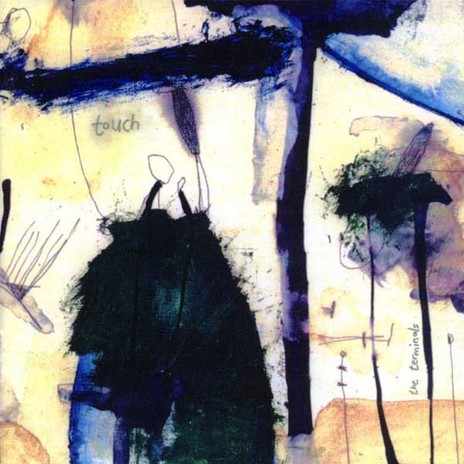
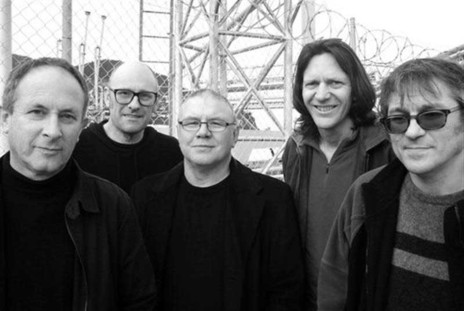
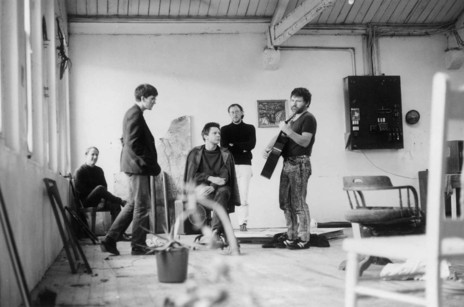
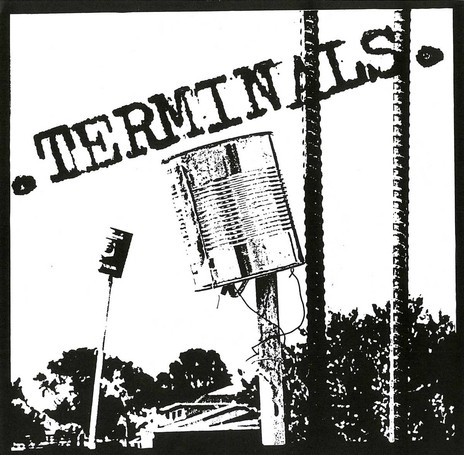
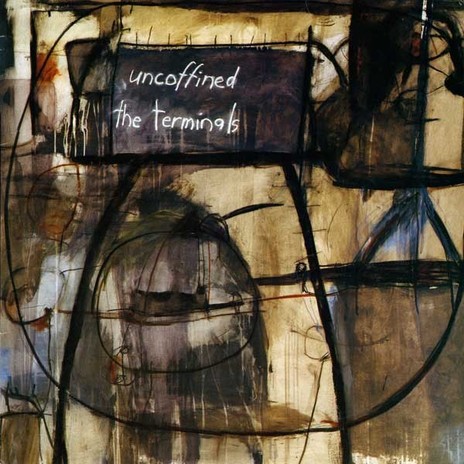
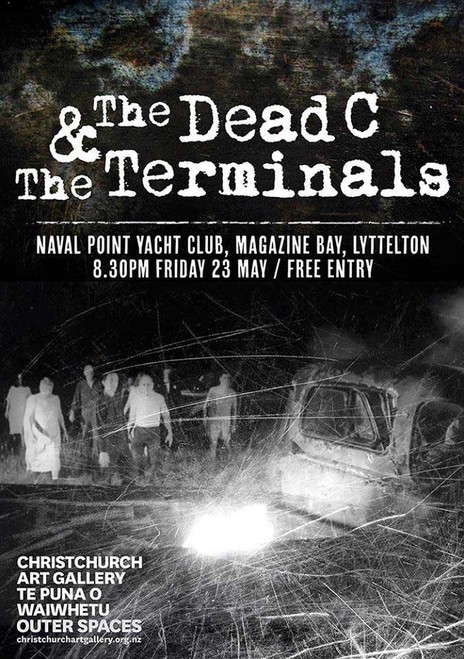
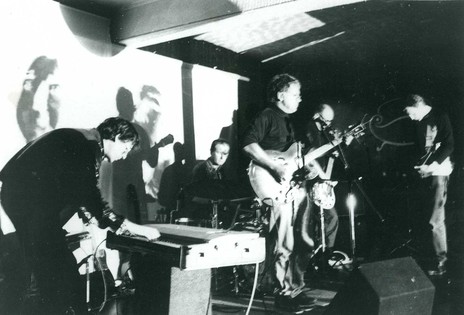
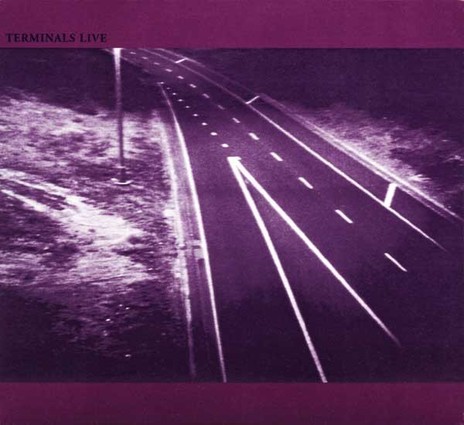
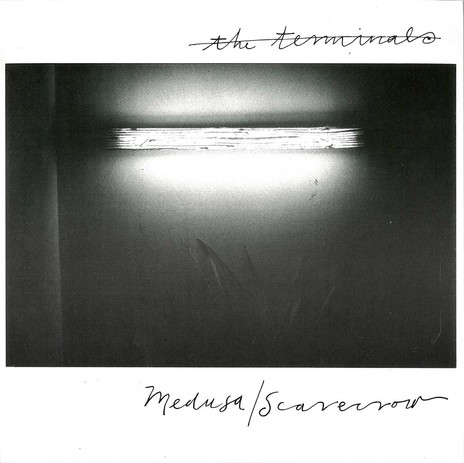
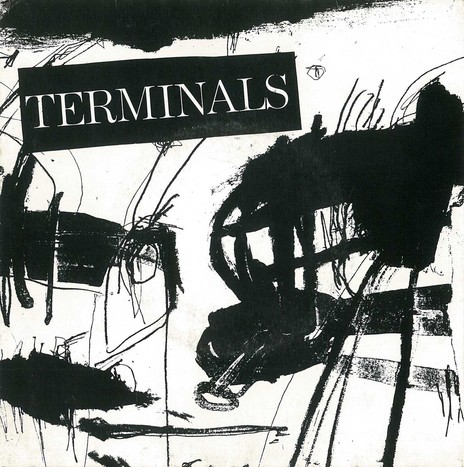
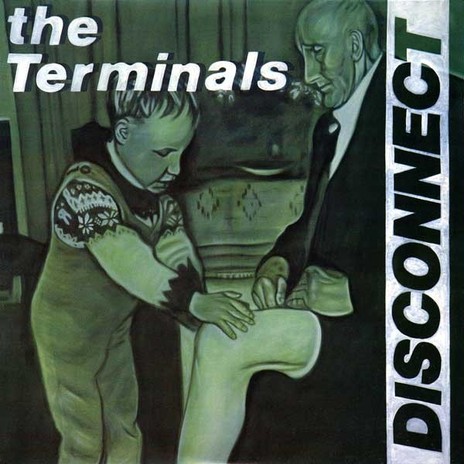
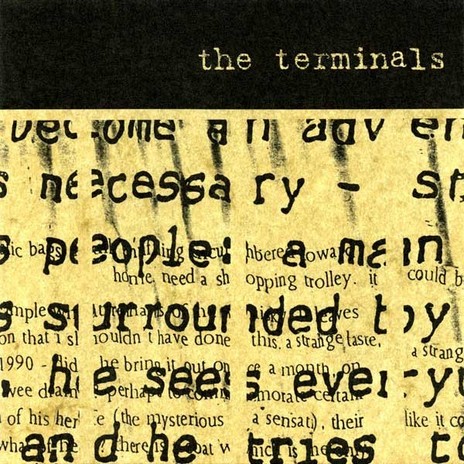
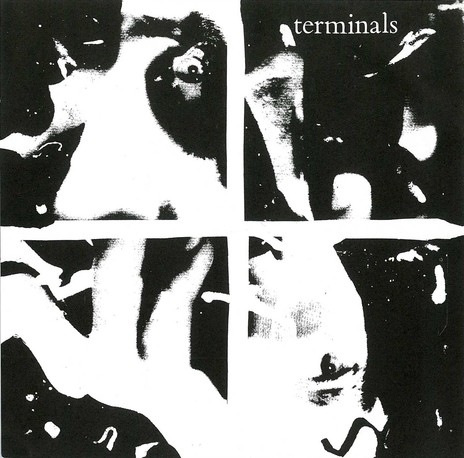
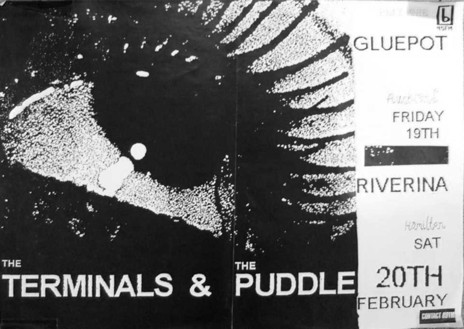
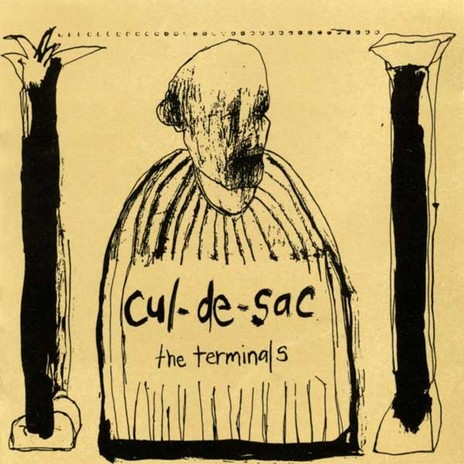
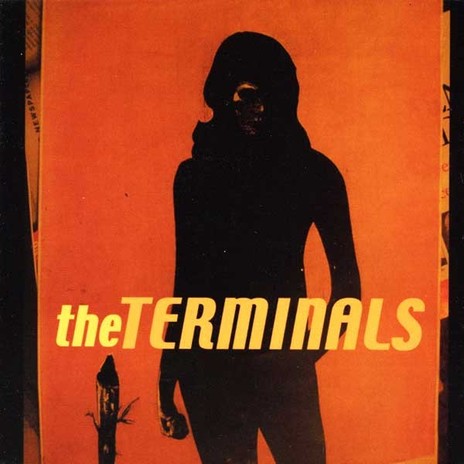
Stephen Cogle - vocals
Peter Stapleton - drums
Mick Elborado - guitar, keyboards
Susan Heney - bass
Brian Crook - guitar, vocals
Maryrose Crook - bass
John Chrisstoffels - cello, bass
Ross Humphries - guitar, vocals
Nicole Moffatt - violin, vocals
Visit our sister site
NZ On ScreenMade with funding from
NZ On Air